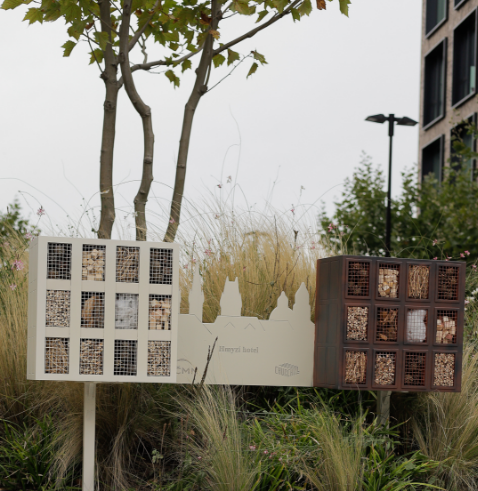The Christmas drink at the Churchill building
During the Advent season, the Christmas Drink event took place in the Churchill building. Tenants were offered a hot Christmas beverage accompanied by traditional sweets, creating a pleasant festive atmosphere in the common areas.
The same Advent gatherings were held across our entire portfolio, taking place in a total of 13 office buildings. More than 3,765 servings of Christmas drinks and 51 kg of traditional Christmas sweets were served, helping to create a warm pre-Christmas atmosphere directly in the workplace.
We would like to thank all our tenants for the lovely meetings. We are pleased that we could make the pre-Christmas season more enjoyable and bring a touch of Advent spirit to the buildings we manage.
Churchill Square is investing in the future: Facades and windows are cleaned by drones, saving money and the environment
A new era in window and facade cleaning: drones replace scaffolding and harsh chemicals. A new and innovative approach is revolutionizing the way buildings are cleaned — using drones instead of suspended platforms and aggressive cleaning agents. This method significantly reduces costs, improves safety, and minimizes environmental impact. The Czech Republic is now seeing its first examples of this technology in action, even in protected heritage zones. Drones have been deployed to clean commercial buildings owned by Českomoravská Nemovitostní (ČMN), including Churchill Square and Mezi Vodami. How does drone cleaning ork? The drones spray demineralized water heated to 70 °C, eliminating the need for strong chemical cleaners. This environmentally friendly method not only protects the planet but also preserves building facades — especially important in heritage areas where traditional chemicals could damage historical plasterwork. „We’re always looking for new ways to enhance our services,” says Petra Vondrová, Senior Property Manager at Churchill. „When we heard about the possibility of drone cleaning, we were eager to try it. Churchill’s size made it the perfect candidate for a large-scale test. The results really surprised us — tenants were happy, and even passersby stopped to watch the drones in action.” Key benefits of the new technology 1. Cost savings Drone cleaning leads to significant cost reductions. With fewer personnel and faster cleaning times, this method is more efficient than traditional approaches. „We had some initial reservations, but once we saw the first results, we were convinced. It’s not just faster, it’s also more affordable. Plus, the savings allow us to reinvest in further innovation,” adds Dita Lawn, Senior Property Manager at Mezi Vodami. 2. Improved safety One of the main advantages of drone technology is enhanced safety. Traditional facade cleaning often involves workers suspended high above ground, which carries inherent risks. Drones, on the other hand, are operated by a two-person team — a pilot and a safety technician — significantly reducing the risk of accidents and lowering personnel costs. 3. Environmental responsibility Cleaning buildings in heritage zones presents a unique challenge — not just due to limited accessibility, but also because of the strict need to protect historic structures. Harsh chemicals can damage delicate lime-based plasters and deeper facade layers, compromising the integrity of older buildings. Drones offer a gentle, chemical-free solution — making them ideal for use in historically sensitive areas. Is the future drones? Encouraged by positive feedback, drone cleaning is being expanded to other properties. „The pilot project was so well received that we’re planning to use drones for other ČMN properties in the future. CBRE also participated in the trial and is now deploying the technology at several of its own sites,” Vondrová concludes. While drone-based cleaning isn’t yet an industry standard, it’s gaining popularity thanks to companies like ČMN that are embracing the change. With its lower costs, safer operation, and eco-friendly impact, drone cleaning has the potential to transform the way we care for our buildings.
A Sweet start to summer at Churchill
With the arrival of the first summer days, the popular Yes Yes gelato stand returned to the lobby of the Churchill building, offering delicious and refreshing ice cream. This sweet treat was the perfect way to cool down and added a delightful touch to the workday.
We hope you enjoyed this little taste of summer – and we look forward to more sunny moments together!
